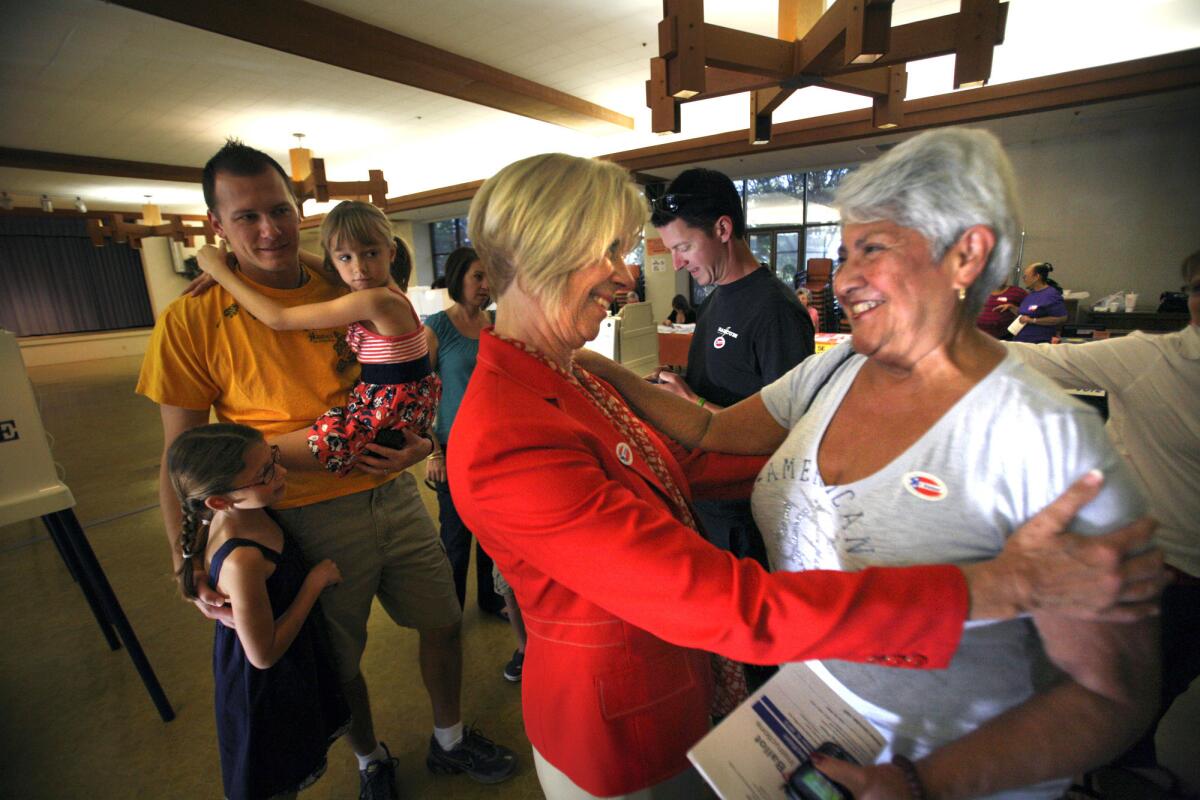This is what it’s like to run for local office -- from 2,296 miles away
- Share via
Reporting from Washington — Stay as long as you are useful.
That was the message at the bipartisan prayer breakfast for members of Congress. For John Dingell, the man speaking that morning, it meant spending 59 years in the House of Representatives. For Janice Hahn, watching her former colleague from the audience, her time will be significantly shorter.
Five years ago, she ran in a special election to fill the remainder of Rep. Jane Harman’s term. Hahn, a Democrat, was reelected in 2012 and 2014 but is giving up a job that for many politicians would represent a career high point.

Rep. Janice Hahn is congratulated by L.A. City Councilman Joe Buscaino after winning reelection in 2012.
She’s leaving in the hope of returning to Los Angeles County government.
And on a recent day, it was clear the cross-country run for office is never far from the congresswoman’s mind or actions.
It’s 9:30 a.m., and Hahn is meeting with the deputy secretary of transportation to talk about the federal government’s ability to regulate passenger comfort on airplanes. This is her second activity on a busy day in Congress, and it comes after Hahn flew into Washington the night before for two conference calls, a vote and a meeting.
In this meeting, Hahn is impatient. She sits with her arms crossed and frequently interrupts the deputy secretary’s staff, saying her questions aren’t being answered. And time is of the essence.
“I only have a year and a half left,” she tells the aides.
Though she ran unsuccessfully for Congress in 1998 and lieutenant governor in 2010, most of Hahn’s political career has been in local government. She was elected to the city of Los Angeles’ Charter Reform Commission in 1997 and then the L.A. City Council in 2001, where she represented the Watts and San Pedro communities for a decade.
Making the jump to Congress was like “drinking water from a fire hose,” Hahn said.
And it hasn’t been all it’s cracked up to be. There’s no power in being a junior member of the minority party of a 435-person legislative body.

Rep. Janice Hahn greets Rosemary Mossbarger, right, at the Little Sisters of the Poor auditorium in San Pedro after Mossbarger cast her vote. Hahn ran five years ago and was reelected in 2012.
There’s also the logistics of being in Congress. When she was first elected, Hahn bunked with Rep. Jackie Speier before renting an apartment minutes from her office. The bare-bones unit, which Hahn described as having a couch, a bed and a shower curtain, was an added expense she didn’t factor into her congressional bid.
There’s also the commute from her home in San Pedro. Pulling out of her driveway at 4:45 a.m. on a Monday or Tuesday, Hahn stops at Starbucks for a coffee and newspaper and then hops on an 8 a.m. American Airlines flight to Washington’s Reagan National Airport. Sitting in a window seat, Hahn typically reads material for the week ahead. But last night, she paid $5.99 to watch “Chariots of Fire.”
She flies back on Thursdays or Fridays to be in the district every weekend. On the way, she reviews the week’s news clippings.
The bigger challenge is serving in the minority party at a time when the House of Representatives has never appeared more divided, Hahn said. The Republican Party sets committee assignments, schedules and votes.
“Many times a vote will change,” she said. “It’s hard sometimes to be prepared. It’s not as methodical or thoughtful a process.”
SIGN UP for our free Essential Politics newsletter >>
There’s also her junior status. In committee meetings, the congresswoman may wait two hours to ask one question of a witness. In her first year serving, Hahn piggybacked on the remainder of Harman’s term and was given her predecessor’s plush office. Once she began her own term, she was moved to a less desirable location in the Cannon Building, thanks in part to Democrats losing the majority.
If she is elected to the Board of Supervisors next year, Hahn will find herself in a building bearing her father’s name. Kenneth Hahn was a legendary figure on the Board of Supervisors, serving South Los Angeles from 1952 to 1992. In her Washington office, Hahn keeps a picture of her father welcoming Martin Luther King Jr. to Los Angeles in 1961. Next to it is a picture of Hahn with Martin Luther King III.
The elder Hahn’s name is frequently invoked in the congressional office.
It’s 11 a.m. Compton Mayor Aja Brown and Hahn are discussing transit funds for the Metro Blue Line, the light rail line running from downtown Los Angeles south to Long Beach.
“My dad was the big champion for the Blue Line,” Hahn said proudly. Potholes: “That was my father’s big thing.” On the subject of the drought, Hahn reminds visitors her father floated the idea of building a water pipeline from Alaska to California.
The name will likely be an asset for Hahn as she campaigns in the district.

Congresswoman Janice Hahn greets a supporter during a 2012 election party at the Ports O’Call restaurant in San Pedro.
“Among political and community leaders in that part of the county, the Hahn name still packs a powerful punch,” said Dan Schnur, director of the Jesse M. Unruh Institute of Politics at USC.
Hahn is one of three candidates running to fill the 4th District seat on the Los Angeles County Board of Supervisors. Supervisor Don Knabe is retiring after nearly 20 years of representing an area that stretches from the beach communities to Long Beach to Diamond Bar. Former Redondo Beach Mayor Mike Gin and former Manhattan Beach Mayor Steve Napolitano are also running. Both men have served as members of Knabe’s staff.
The Hahn campaign raised $331,488 in the first six months of the year, according to campaign finance reports. Napolitano brought in $141,534 and the Gin campaign raised $114,273. The next fundraising deadline is Dec. 31.
Of the four women who have been elected to the L.A. County Board of Supervisors, two first served in Congress. Supervisor Hilda Solis was in Congress for eight years before she became President Obama’s labor secretary. She was elected to the Board of Supervisors in 2014. The first woman to serve on the county board was former Rep. Yvonne Burke. After seven years in Congress, Burke was elected to the 4th District. She served for one year, and then was reelected to the 2nd District in 1992 when Kenneth Hahn retired. (The two other women, Gloria Molina and Sheila Kuehl, came from local and state government.)
“There’s no separation of powers,” Burke said of the board. “You have the opportunity not only to legislate but then administratively, carry out the things that you legislate.”
“I think probably most members of Congress would look forward to having that kind of experience,” Burke said.
And that kind of power. On this particular day in Washington, there are reminders of how little power Hahn has and how much power she could take on if she wins next year’s election.

Rep. Janice Hahn in 2011.
It’s 11:45 a.m. On the floor of the House, the congresswoman gave a one-minute speech on airline passengers’ rights. Her audience was made up of tourists and a handful of other lawmakers waiting to make their own statements. As Hahn waited her turn, others spoke about National Citizenship Day and the Sugar Reform Act, and recognized constituents for serving in the military.
From there, Hahn heads to the members’ dining room at the U.S. Capitol. While she’s enjoying a lunch of bean soup and salad, Rep. John Carney of Delaware stops at her table to chat about how short their time in Congress may be. He’s running for governor.
After lunch, Hahn attends a subcommittee hearing on small banks and credit unions. Rep. Trent Kelly, a Republican from Mississippi, told a panel of witnesses that he has visited banks in all 22 counties of his congressional district. Los Angeles County is so large that it has a congressional delegation of 18. Hahn, who represents roughly 700,000 today, would have 2 million constituents if she becomes a supervisor.
In Los Angeles County, the five supervisors get to take on a range of meaty public policy issues. In 2014, its hospitals and clinics provided care to 820,000 people. Social workers investigated 87,000 cases of child abuse. It’s home to the country’s largest jail system, housing more than 18,000 inmates.
On top of all that, the supervisors receive relatively little media attention compared with the Los Angeles mayor and city council members at the other end of Grand Park. Supervisors earn a $189,000 annual salary. Members of Congress make $174,000 per year. A sitting supervisor hasn’t been voted out of office since 1980. And an incumbent hasn’t run for higher office since Mike Antonovich’s unsuccessful 1986 campaign for the U.S. Senate.
“That should tell you how much they value the authority those jobs give them,” Schnur said.
The backdrop of Hahn’s day in Washington is a pending vote on funding for Planned Parenthood, so partisan tensions are high.
“I don’t enjoy this kind of brinkmanship,” Hahn said in her Capitol Hill office, a day before her Republican colleagues voted to defund the organization and threatened to shut down the federal government. “I think it’s a bad way to govern. It’s crisis to crisis.”
And with Congress facing such gridlock, Hahn is hardly the first lawmaker to eye the exit for more satisfying work back home.
After just two terms in the House, Republican Rep. Tim Griffin of Arkansas in 2013 decided to skip a reelection bid and run instead for lieutenant governor. He declared he missed his family and wanted to see more of them.
The same year, Hahn’s Democratic colleague in the California delegation, Gloria Negrete McLeod, vacated her seat to run for the San Bernardino County Board of Supervisors.
“It was about serving the people right at home and being home,” she said. “You’re flying back and forth so I really wanted to be close to home.”
McLeod lost that race to Republican Assemblyman Curt Hagman.
It’s now the late afternoon. With the Congressional Black Caucus in town, Hahn has spent the last three hours since the subcommittee hearing running between floor votes on the Planned Parenthood issue and meetings with African American politicians from her district.
Assemblymen Mike Gipson and Reggie Sawyer-Jones make unexpected stops in the office. The three share a political consultant and Sawyer-Jones tells the congresswoman a news release is going out that afternoon announcing her support for his reelection campaign.
Another visitor was Assemblyman Sebastian Ridley-Thomas, whose father, Mark Ridley-Thomas, is on the L.A. County Board of Supervisors.
The interaction between Sebastian Ridley-Thomas and Hahn is warm and familiar. They sit side-by-side on a couch and Ridley-Thomas starts listing the projects for which he wants Hahn’s help. One is the establishment of a medical village at Martin Luther King Jr. Community Hospital, which Hahn’s father helped establish after the 1965 Watts Riots. The project is important to Supervisor Ridley-Thomas, as the assemblyman calls his father.
“He’s going to get better and better partners [on the board],” Ridley-Thomas tells the congresswoman, smiling.
At 5 p.m., Hahn takes one last walk through the underground tunnel to the House Chamber for a vote. Realizing she no longer has to attend an evening reception, the congresswoman coordinates with her staff to drive her back home.
ALSO:
Rep. Janice Hahn announces run for L.A. County Board of Supervisors
Janice Hahn, Elan Carr score big endorsements in county supervisor races
For more, go to www.latimes.com/politics.
More to Read
Get the L.A. Times Politics newsletter
Deeply reported insights into legislation, politics and policy from Sacramento, Washington and beyond. In your inbox three times per week.
You may occasionally receive promotional content from the Los Angeles Times.











